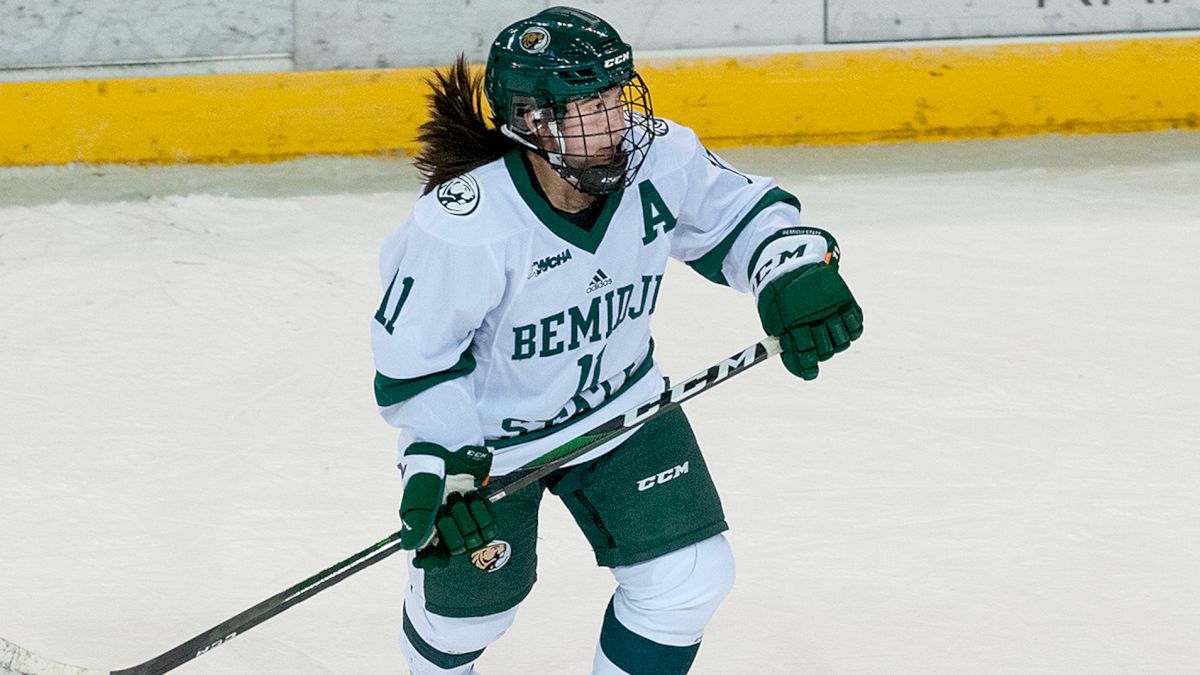WCHA Helps Launch 'College Hockey for Diversity, Equity & Inclusion'
WCHA Helps Launch 'College Hockey for Diversity, Equity & Inclusion'
The WCHA helped launch the College Hockey for Diversity, Equity & Inclusion, and we caught up with one of the most vocal student supporters.

A 27-person group representing all 11 men’s and women’s NCAA Division I hockey conferences chose Black History Month to roll out a new initiative titled “College Hockey for Diversity, Equity and Inclusion.”
WCHA women’s commissioner Jennifer Flowers is the chair of the committee and helped organize meetings and discussions over this past summer. One of the most vocal student-athletes in the group is Bemidji State women’s alternate captain Tina Kampa, a native of Colombia. Earlier this month Tina spoke to Bemidji broadcaster Kelly Schultz about the mission of the new initiative.
SCHULTZ: How did you get involved?
Kampa: I was talking to Jen [WCHA commissioner Flowers] in one of our leadership WCHA meetings and we’d been talking about a lot of the instances and events that had happened this summer, and when it came to social justice, it’s just something that I’ve been passionate about for a very long time. So she asked me to be a part of this group. We didn’t know exactly what it was going to be in its entirety, but we had some goals, and I said ‘why not?’
Take us back to when you were growing up in Minnesota and being born in Colombia.
I was adopted as a baby, so I don’t really remember much about that. I’ve always known Maple Grove and Minnesota and that’s where I’ve spent my whole childhood. I grew up in a white community and white family, so I had a lot of opportunities that way. My dad was the hockey guy in the family, he was the one who introduced me to the game.
I started out on figure skates, didn’t like it very much, ended up getting into hockey skates and never wanted to leave the ice. I ended up loving hockey, putting a lot of effort into it and having a lot of great opportunities to be successful and work my way up.
What are you hoping this initiative accomplishes?
I hope it accomplishes a lot. It’s not going to happen overnight and we recognize that, but I think a couple things is obviously the diversity aspect of hockey, it’s a predominantly white sport. We just want to give a lot of outreach to different communities and areas and states and countries and things that maybe don’t know what hockey is, or don’t have a lot of access to the game or just want to learn more. That’s something that I’m passionate about, being a non-white hockey player.
But also, the equity part. No matter who you are, you’re background, where you came from, who you love, what you identify as, it should be a game for everybody. It shouldn’t matter, any of those things, we need to be inclusive for all people, and that’s just a couple areas that we’ve touched on, and we want to continue to make better.
I think that this group of leaders is 100% in the right direction as far as the initiative, and I’m really excited.
On the hockey side, what can the rest of us do?
As a hockey community, being predominantly white, specifically, at Bemidji, I’m the only person of color in the locker room, in the arena a lot of the time. I think the biggest thing that allies and people can do that aren’t people of color, are understanding that they have an opportunity. If they want to see positive change, if they want hockey to be a better sport, it’s going to be up to them.
It’s going to be educating themselves, it’s going to be having those uncomfortable conversations, it’s going to be admitting that maybe they don’t know a lot, or maybe they’re afraid to say the wrong thing. But that’s OK, you’ve got to start somewhere. What I’ve learned this year with speaking out, and maybe going against the grain with advocating, it’s been hard because I do feel alone a lot of the time. That doesn’t mean I’m not supported. I think that people who hold privilege and have this platform, being a women’s college hockey player at the Division I level, there’s a lot we can do.
It starts with education, it starts with listening, it starts with advocating and using our privilege and speaking out on things. Not letting racism and discrimination just happen. Not only does it happen in the game of hockey, but it happens everywhere. The more we can educate ourselves, and listen, and speak on the things that hold true to us, that’s not only going to make the hockey world a better place, but it’s going to make the world a better place.
People can say they want to support, and that they’re listening, and that they care, but if you say one thing and you don’t do another thing, are you really creating positive change? It’s going to take a lot of work, a lot of persistence. It’s just compassion and love and empathy, trying to understand people. At the end of the day, if that was you or somebody you loved, would you want those things to be happening to those people? And if not, what are you going to do about it? Holding privilege is honestly the best opportunity you can have.
I’ve learned that I hold privilege within myself. I try to do what I can with my platform here. It’s not an easy road, but positive change won’t happen if those with privilege don’t care enough to do something about it.
Tim Rappleye is the author of two books: Jack Parker's Wiseguys and Hobey Baker, Upon Further Review. You can find him on Twitter.